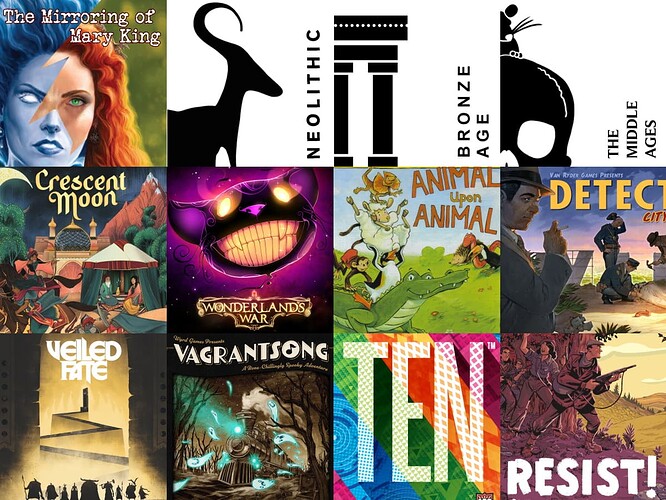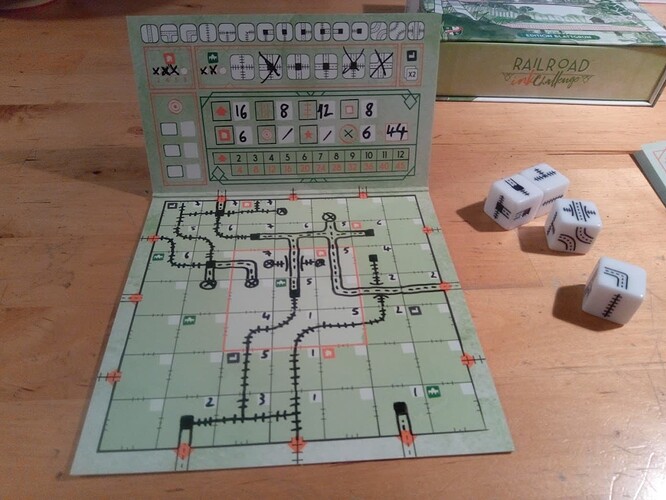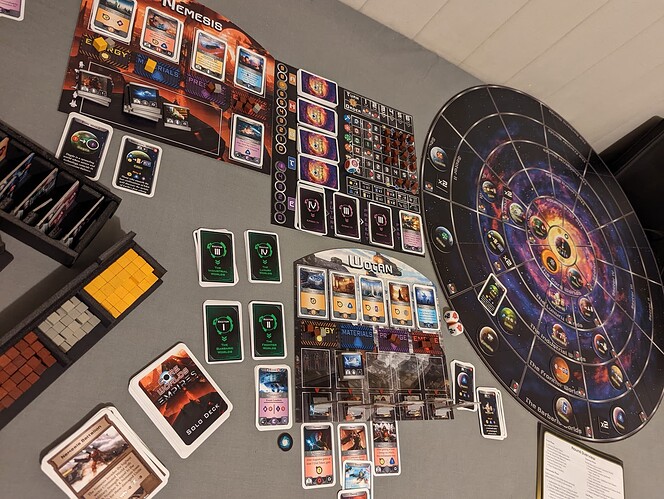I just wrapped a couple solo games of the new Andrew Parks Kickstarter that arrived, Core Worlds: Empires.
This one kind of takes its spiritual predecessor, the deck builder Core Worlds, and bolts it into a worker placement framework. You start with a random empire with 5 drafted worlds, and 3 workers - a random leader and two other generics, ‘ambassadors’.
The progression of the event deck triggers the gradual arrival of two more, for a total of five. The generic ambassadors can be upgraded to ‘heroes’ during the game, which, like the Leader, have combat stats and an ability card. All the workers can hold a hand of cards and a retinue of unit tokens, which are used when annexing other worlds.
The general sequence of play is: progressing/resolving the event deck, placing new neutral worlds, then taking it in turns to move each worker either to a world or an advancement.
Earlier worlds tend to give base resources, with later ones more about trading resources from one type to another, including cards and units. Advancements are upgradeable slots on your player board that do similar.
After workers have moved, conflicts are resolved which involves spending unit tokens at the world the worker is at to try annex it. There’s also player conflict here, with rules for determining military dominance and damaging/destroying each other’s units. No dice involved, it’s all about the units, hero, and tactic cards you play.
In the solo mode, you just draw a card for each bot turn. No deck segmentation/stacking, it’s a straight random shuffle. The bot mostly just scores, and competes for cards and worlds, but it works well as some of its cards increase in strength based on event deck progress, so you’re watching for them and hoping they come early. The only aspect of the multiplayer game that seems missing in solo is the conflict resolution, where you can damage and destroy each other’s units when competing for a world. Here you can damage the bot’s units, which are listed on the solo card, but not vice versa.
Once the last turn is done, you compare VPs from all your Worlds and a specific VP resource (called Empire Points) to get a winner. It’s refreshingly simple scoring for the genre! There is also a cool wrinkle where the last set (‘Epoch’) of event cards can each score bonus points based on amounts of the various resources you have, each card tied to a different resource. A fixed amount of Event cards come out each game by default, but they are a resource themselves and you can use worker actions to get up to 5 extra ones per turn - so you’re aiming to get more to come out late game if you want to try get those bonus points. Or not, if you’re behind in most resource counts!
I enjoyed it. First game was a mess, but the second went smoothly. The strategy was heavily influenced by my random starting situation, and I liked how drafting gave you some slight control over empire focus. There’s a token players compete for, that lets the owner choose between two worlds when a new one comes out, which I found very useful in picking worlds that meshed with your own goals.
There are a lot of bits in the box but the game ends up playing fairly simply and smoothly. No storage solution is included so I had to build my own, otherwise setup/teardown is just too painful! Especially at the end, when lots of stuff is out.


